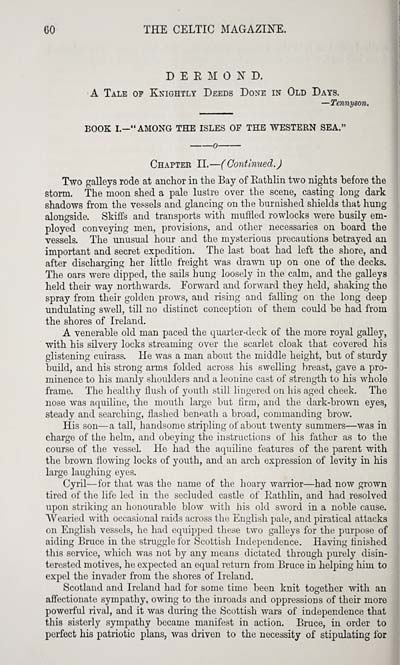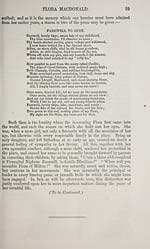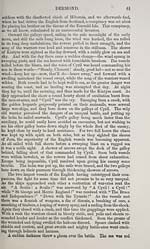Blair Collection > Celtic magazine > Volume 5
(70)
Download files
Complete book:
Individual page:
Thumbnail gallery: Grid view | List view

60 THE CELTIC MAGAZINE.
D E R M N D.
A Tale op Knightly Deeds Done in Old Days.
—Tennyson,
BOOK I.—" AMONG THE ISLES OF THE WESTEEN SEA.'
Chapter II. — (Continued.)
Two gaUeys rode at anchor in the Bay of Rathlin two nights before the
storm. The moon shed a pale lustre over the scene, casting long dark
shadows from the vessels and glancing on the burnished shields that hung
alongside. Skiffs and transports mth muffled rowlocks were busily em-
ployed conveyuig men, provisions, and other necessaries on board the
vessels. The unusual hour and the mysterious precautions betrayed an
important and secret expedition. The last boat had left the shore, and
after discharging her little freight was drawn up on one of the decks.
The oars were dipped, the sails hung loosely in the calm, and the gaUeys
held their way northwards. Forward and forward they held, shaking the
spray from their golden prows, and rising and falling on the long deep
undulating swell, till no distinct conception of them could be had from
the shores of Ireland.
A venerable old man paced the quarter-deck of the more royal gaUey,
with his silvery locks streaming over the scarlet cloak that covered his
glistening cuirass. He was a man about the middle height, but of sturdy
build, and his strong arms folded across his swelling breast, gave a pro-
minence to his manly shoulders and a leonine cast of strength to his whole
frame. The healthy flush of youth still lingered on his aged cheek. The
nose was aquiline, the mouth large but firm, and the dark-brown eyes,
steady and searching, flashed benf-ath a broad, commanding brow.
His son — a tall, handsome stripling of about twenty summers — was in
charge of the helm, and obeying the instructions of Ms father as to the
course of the vessel He had the aquiline features of the parent with
the Ijrown flowing locks of youth, and an arch expression of levity in his
large laughing eyes.
Cyril — for that was the name of the hoary warrior — had now grown
tired of the life led in the secluded castle of Eathlin, and had resolved
upon striking an honourable blow with his old sword in a noble cause.
Wearied with occasional raids across the English pale, and piratical attacks
on English vessels, he had equipped these two galleys for the purpose of
aiding Bruce in the struggle for Scottish Independence. Having finished
this service, which was not by any means dictated through purely disin-
terested motives, he expected an equal return from Bruce in helping him to
expel the invader from the shores of Ireland.
Scotland and Ireland had for some time been knit together with an
affectionate sympathy, owing to the inroads and oppressions of their more
powerful rival, and it was during the Scottish wars of independence that
this sisterly sympathy became manifest in action. Bruce, in order to
perfect his patriotic plans, was driven to the necessity of stipulating for
D E R M N D.
A Tale op Knightly Deeds Done in Old Days.
—Tennyson,
BOOK I.—" AMONG THE ISLES OF THE WESTEEN SEA.'
Chapter II. — (Continued.)
Two gaUeys rode at anchor in the Bay of Rathlin two nights before the
storm. The moon shed a pale lustre over the scene, casting long dark
shadows from the vessels and glancing on the burnished shields that hung
alongside. Skiffs and transports mth muffled rowlocks were busily em-
ployed conveyuig men, provisions, and other necessaries on board the
vessels. The unusual hour and the mysterious precautions betrayed an
important and secret expedition. The last boat had left the shore, and
after discharging her little freight was drawn up on one of the decks.
The oars were dipped, the sails hung loosely in the calm, and the gaUeys
held their way northwards. Forward and forward they held, shaking the
spray from their golden prows, and rising and falling on the long deep
undulating swell, till no distinct conception of them could be had from
the shores of Ireland.
A venerable old man paced the quarter-deck of the more royal gaUey,
with his silvery locks streaming over the scarlet cloak that covered his
glistening cuirass. He was a man about the middle height, but of sturdy
build, and his strong arms folded across his swelling breast, gave a pro-
minence to his manly shoulders and a leonine cast of strength to his whole
frame. The healthy flush of youth still lingered on his aged cheek. The
nose was aquiline, the mouth large but firm, and the dark-brown eyes,
steady and searching, flashed benf-ath a broad, commanding brow.
His son — a tall, handsome stripling of about twenty summers — was in
charge of the helm, and obeying the instructions of Ms father as to the
course of the vessel He had the aquiline features of the parent with
the Ijrown flowing locks of youth, and an arch expression of levity in his
large laughing eyes.
Cyril — for that was the name of the hoary warrior — had now grown
tired of the life led in the secluded castle of Eathlin, and had resolved
upon striking an honourable blow with his old sword in a noble cause.
Wearied with occasional raids across the English pale, and piratical attacks
on English vessels, he had equipped these two galleys for the purpose of
aiding Bruce in the struggle for Scottish Independence. Having finished
this service, which was not by any means dictated through purely disin-
terested motives, he expected an equal return from Bruce in helping him to
expel the invader from the shores of Ireland.
Scotland and Ireland had for some time been knit together with an
affectionate sympathy, owing to the inroads and oppressions of their more
powerful rival, and it was during the Scottish wars of independence that
this sisterly sympathy became manifest in action. Bruce, in order to
perfect his patriotic plans, was driven to the necessity of stipulating for
Set display mode to: Large image | Transcription
Images and transcriptions on this page, including medium image downloads, may be used under the Creative Commons Attribution 4.0 International Licence unless otherwise stated. ![]()
| Early Gaelic Book Collections > Blair Collection > Celtic magazine > Volume 5 > (70) |
|---|
| Permanent URL | https://digital.nls.uk/76449822 |
|---|
| Description | Volume V, 1880. |
|---|---|
| Shelfmark | Blair.6 |
| Attribution and copyright: |
|
| Description | A selection of books from a collection of more than 500 titles, mostly on religious and literary topics. Also includes some material dealing with other Celtic languages and societies. Collection created towards the end of the 19th century by Lady Evelyn Stewart Murray. |
|---|
| Description | Selected items from five 'Special and Named Printed Collections'. Includes books in Gaelic and other Celtic languages, works about the Gaels, their languages, literature, culture and history. |
|---|

